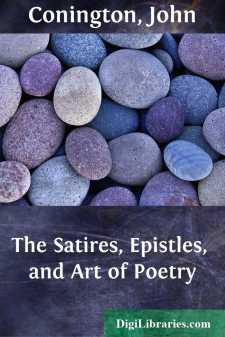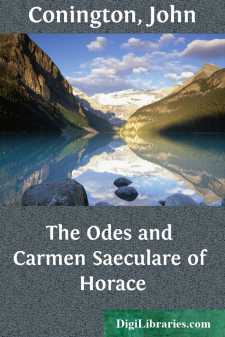Categories
- Antiques & Collectibles 13
- Architecture 36
- Art 48
- Bibles 22
- Biography & Autobiography 813
- Body, Mind & Spirit 142
- Business & Economics 28
- Children's Books 15
- Children's Fiction 12
- Computers 4
- Cooking 94
- Crafts & Hobbies 4
- Drama 346
- Education 46
- Family & Relationships 57
- Fiction 11828
- Games 19
- Gardening 17
- Health & Fitness 34
- History 1377
- House & Home 1
- Humor 147
- Juvenile Fiction 1873
- Juvenile Nonfiction 202
- Language Arts & Disciplines 88
- Law 16
- Literary Collections 686
- Literary Criticism 179
- Mathematics 13
- Medical 41
- Music 40
- Nature 179
- Non-Classifiable 1768
- Performing Arts 7
- Periodicals 1453
- Philosophy 64
- Photography 2
- Poetry 896
- Political Science 203
- Psychology 42
- Reference 154
- Religion 513
- Science 126
- Self-Help 84
- Social Science 81
- Sports & Recreation 34
- Study Aids 3
- Technology & Engineering 59
- Transportation 23
- Travel 463
- True Crime 29
John Conington
John Conington (1825–1869) was a renowned British classical scholar and translator, best known for his translations of Latin literature. He is celebrated for his English translations of works like Virgil's "Aeneid" and Horace's "Odes", which helped make classical texts more accessible to English readers. Conington held the position of Professor of Latin at the University of Oxford, where he contributed significantly to the study of classical languages. His scholarly work also included insightful commentaries on Roman poets, combining rigorous analysis with a flair for literary interpretation.
Author's Books:
Sort by:
by:
John Conington
In venturing to follow up my translation of the Odes of Horace by a version of the Satires and Epistles, I feel that I am in no way entitled to refer to the former as a justification of my boldness in undertaking the latter. Both classes of works are doubtless explicable as products of the same original genius: but they differ so widely in many of their characteristics, that success in rendering the...
more...
by:
John Conington
I scarcely know what excuse I can offer for making public this attempt to "translate the untranslatable." No one can be more convinced than I am that a really successful translator must be himself an original poet; and where the author translated happens to be one whose special characteristic is incommunicable grace of expression, the demand on the translator's powers would seem to be...
more...



